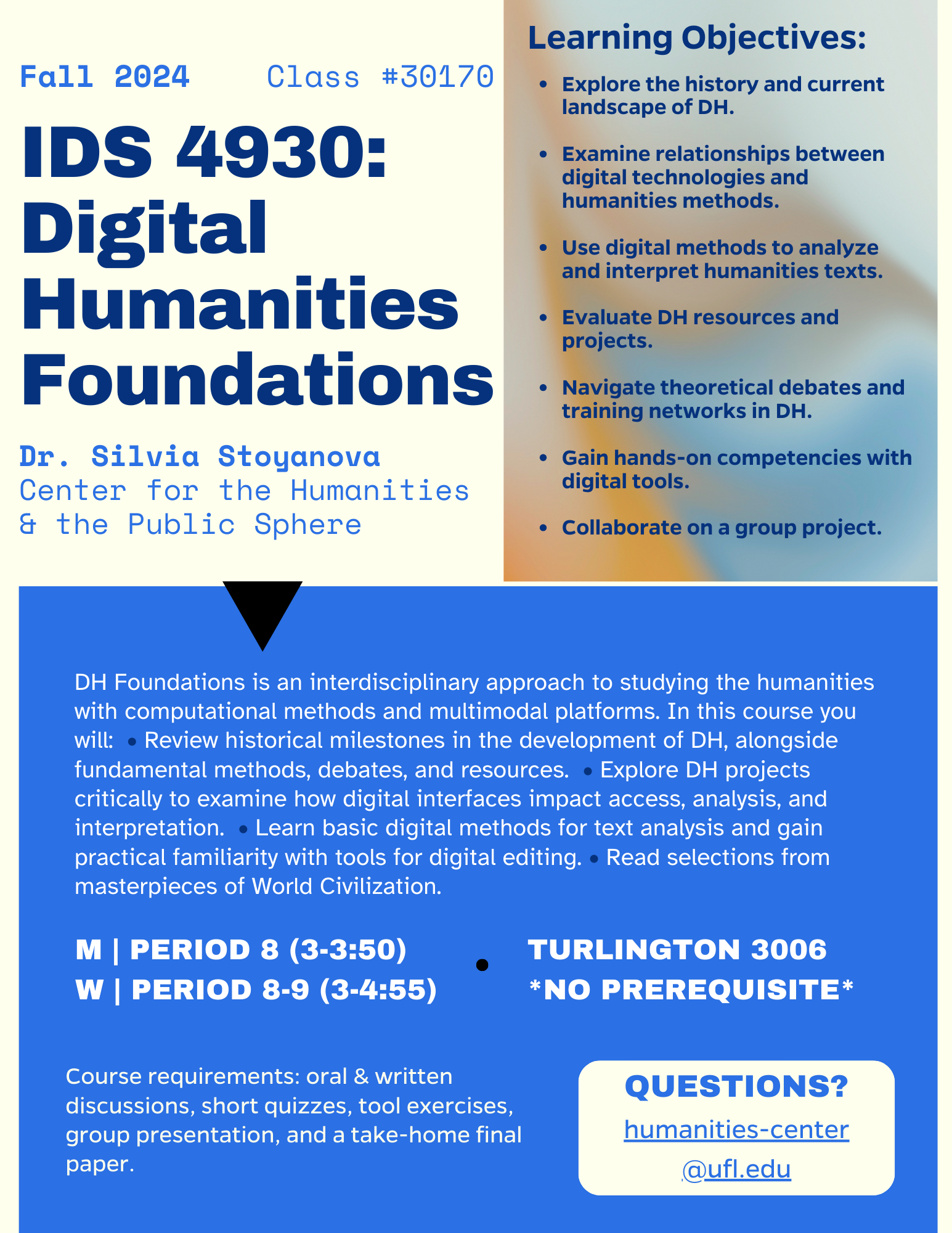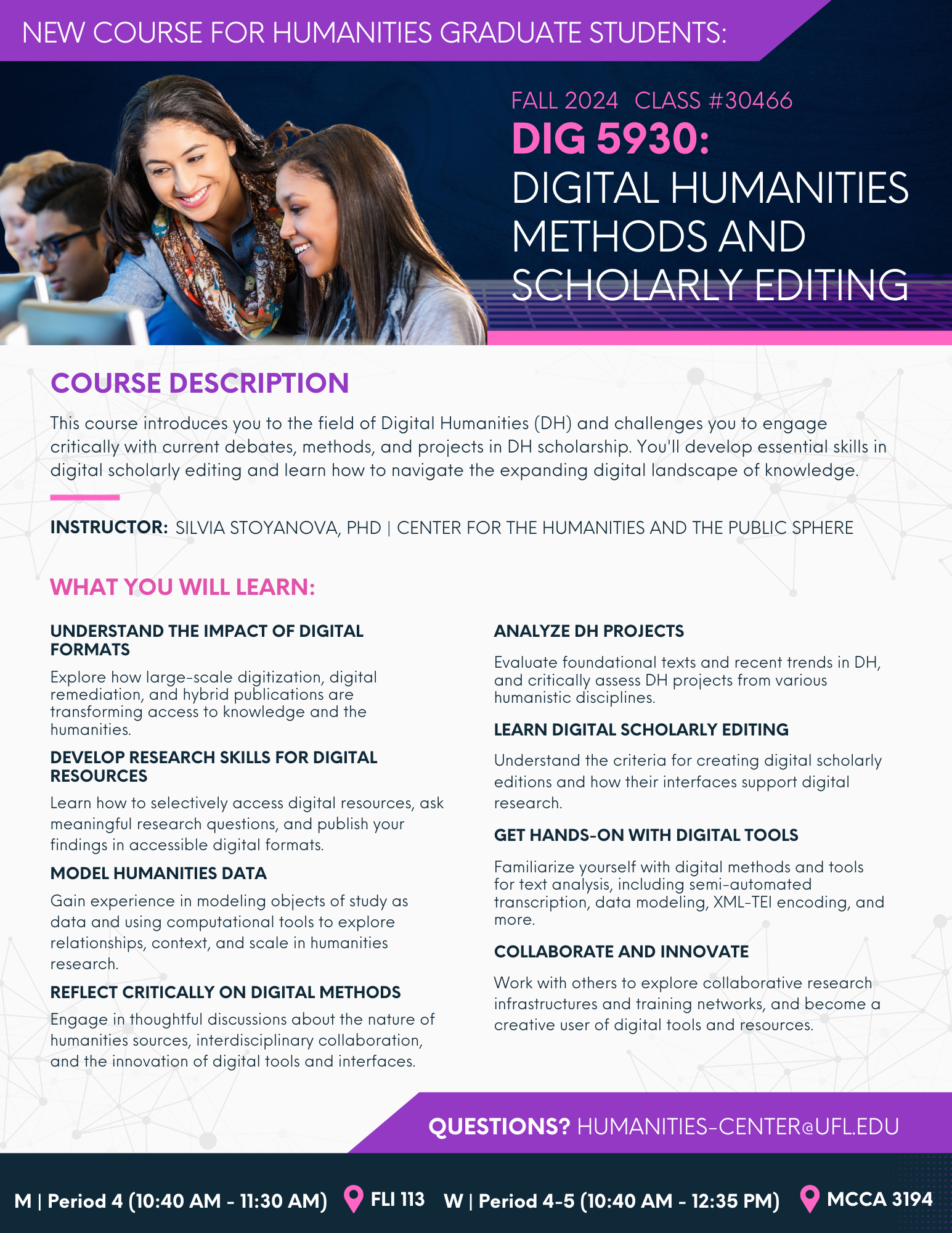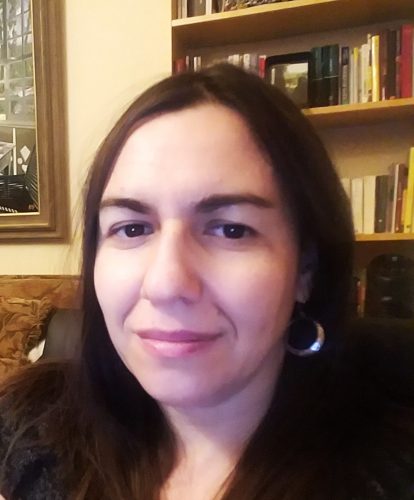The Center for the Humanities and the Public Sphere is excited to announce two new courses for undergraduate and graduate students designed to build foundational skills within the digital humanities. These courses will equip students with the tools and knowledge needed to critically analyze digital projects, engage with innovative research methods, and apply digital tools to enhance their studies.
These courses, taught in-person by the center’s new digital humanities lecturer, Silvia Stoyanova, are scheduled to take place on Mondays and Wednesdays during the Fall 2024 semester. See below for more information about each individual course.
 IDS 4930: Digital Humanities Foundations
IDS 4930: Digital Humanities Foundations
M | Period 8 (3 – 3:50 PM)
W | Period 8-9 (3 – 4:55)
Turlington 3006
DH Foundations is an interdisciplinary approach to studying the humanities with computational methods and multimodal platforms. In this course undergraduates will: • Review historical milestones in the development of DH, alongside fundamental methods, debates, and resources. • Explore DH projects critically to examine how digital interfaces impact access, analysis, and interpretation. • Learn basic digital methods for text analysis and gain practical familiarity with tools for digital editing. • Read selections from masterpieces of World Civilization.
No prerequisite required!
Learning Objectives:
- Explore the history and current landscape of DH.
- Examine relationships between digital technologies and humanities methods.
- Use digital methods to analyze and interpret humanities texts.
- Evaluate DH resources and projects.
- Navigate theoretical debates and training networks in DH.
- Gain hands-on competencies with digital tools.
- Collaborate on a group project.
Course Requirements:
oral & written discussions, short quizzes, tool exercises, group presentation, and a take-home final paper.
 DIG 5930: Digital Humanities Methods and Scholarly Editing
DIG 5930: Digital Humanities Methods and Scholarly Editing
M | Period 4 (10:40 – 11:30 AM) FLI 113
W | Period 4-5 (10:40 AM – 12:35 PM) MCCA 3194
Digital Humanities Methods and Scholarly Editing introduces graduate students to the field of Digital Humanities (DH) and challenges you to engage critically with current debates, methods, and projects in DH scholarship. Students will develop essential skills in digital scholarly editing and learn how to navigate the expanding digital landscape of knowledge.
Learning Objectives
- Understand the impact of digital formats: explore how large-scale digitization, digital remediation, and hybrid publications are transforming access to knowledge and the humanities.
- Develop research skills for digital resources: learn how to selectively access digital resources, ask meaningful research questions, and publish your findings in accessible digital formats.
- Model humanities data: gain experience in modeling objects of study as data and using computational tools to explore relationships, context, and scale in humanities research.
- Reflect critically on digital methods: engage in thoughtful discussions about the nature of humanities sources, interdisciplinary collaboration, and the innovation of digital tools and interfaces.
- Analyze DH projects: valuate foundational texts and recent trends in DH, and critically assess DH projects from various humanistic disciplines.
- Learn digital scholarly editing: understand the criteria for creating digital scholarly editions and how their interfaces support digital research.
- Get hands-on with digital tools: familiarize yourself with digital methods and tools for text analysis, including semi-automated transcription, data modeling, XML-TEI encoding, and more.
- Collaborate and innovate: network with others to explore collaborative research infrastructures and training networks, and become a creative user of digital tools and resources.
 About the Professor
About the Professor
Silvia Stoyanova joined the center in Fall 2024 to help lead its new DH initiatives, including building a new DH Lab and creating programming and curricula designed to support DH scholarship. As the center’s new digital humanities lecturer, Stoyanova brings her extensive experience in program-building to strengthen DH knowledge and resources at UF.
Stoyanova holds a PhD in Italian literature from Columbia University and has conducted postdoctoral research in Digital Humanities. She has taught Italian Studies at Princeton University, Arizona State University, Rutgers University, the University of Iowa, and has given lectures on Digital Humanities at universities in the United States and in Europe.
She is also the editor of Digital Zibaldone—a digital edition and research platform for Giacomo Leopardi’s intellectual notebook. Her scholarship in Digital Humanities addresses the hermeneutic project of the fragment genre in modernity and the modeling of digital scholarly editions as interactive multimodal knowledge sites. Her work in progress is a monograph on Leopardi’s phenomenology of care articulated through digital methods for text analysis and knowledge visualization.
Recent publications include an article on Digital Humanities pedagogy in the International Journal of Humanities and Arts Computing (Vol. 18, Issue 1, 2024) and on the digital edition of Leopardi’s Zibaldone in Magazén: International Journal for Digital and Public Humanities (Vol. 4. No. 1, 2023).